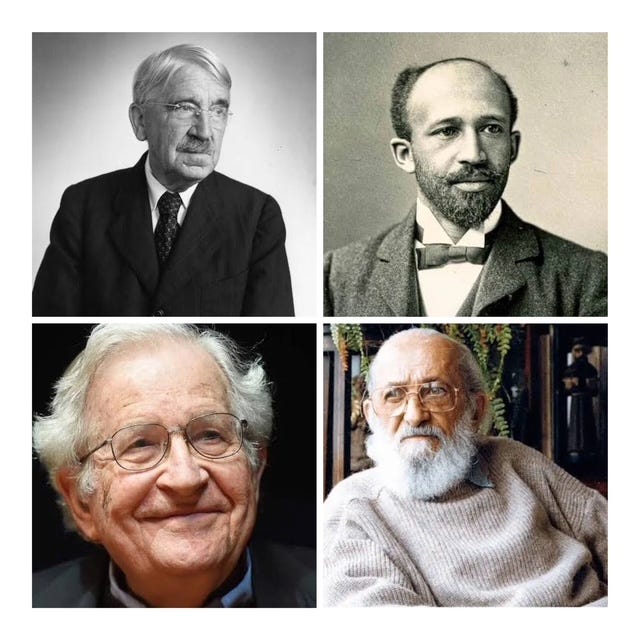
The new MAGA school curriculum.
"Children will be taught to love America. Children will be taught to be patriots. Children will be taught civic values in schools that want federal taxpayer funding. So as we close the Department of Education and provide funding to states, we're going to make sure these funds are not being used to promote communist ideology. For any nation to be successful, it cannot teach its children to hate themselves and to hate their country.” — Stephen Miller at White House Briefing.
"Democracy and democratic education are not things given to people. They are things that people must fight for and build together." — Paulo Freire
Democratic Education vs. Fascist Indoctrination
Education has always been a battleground for ideology, shaping minds, molding beliefs, and instilling values that define a nation’s future. In recent political discourse, Miller’s announcement of the new MAGA school curriculum has reignited concerns about how education can become a tool for ideological control. The MAGA vision—one in which children are "taught to love America" and "be patriots," while schools are stripped of funding if they pursue democratic ideals of social justice, ethnic studies, peace, diversity, racial and gender equality, and freedom, bears unsettling similarities to past authoritarian regimes, particularly the educational policies of Nazi Germany, Francoist Spain, and Mussolini’s Italy.
Nazi Germany’s curriculum, for instance, emphasized Aryan supremacy, obedience to the Führer, and the suppression of dissenting ideas. Teaching about homosexuality was strictly forbidden. The Nazis viewed homosexuality as a threat to their vision of a "pure" Aryan society and actively suppressed any discussion or education on the topic. The Nazis raided and burned the Institute for Sexual Science in Berlin, which had been a leading center for what now is called LGBTQ studies.
Schools were required to teach loyalty above critical thinking, turning classrooms into ideological training grounds. Textbooks were rewritten, lessons were structured to glorify the regime, and any education that encouraged questioning authority was aggressively stamped out.
A similar pattern existed in Francoist Spain, where education was heavily centered on loyalty to the nation and Catholic doctrine, eliminating philosophies that did not align with the government’s vision.
Teachers persecuted.
In Nazi Germany, educators who refused to conform to the state's ideological curriculum were dismissed, arrested, or even sent to concentration camps. All Jewish teachers were fired. The regime demanded absolute loyalty, and teachers who promoted democratic or anti-fascist ideas were seen as threats.
Similarly, in Mussolini’s Italy, teachers were required to swear allegiance to the Fascist Party, and those who resisted were fired or persecuted. Some educators who openly opposed the regime faced imprisonment or exile.
In Francoist Spain, teachers were persecuted, particularly during the Spanish Civil War and in the early years of Franco's rule. Franco's Nationalist forces targeted teachers, especially those from leftist areas or associated with national minority groups, as potential security threats or to promote nation-building policies. This persecution included summary executions and purges from public schools.
* * *
Miller’s announced curriculum mirrors these strategies: a focus on mandated patriotism, an attempt to purge ideologies deemed contrary to Trumpism, and a centralization of control over democratic (“communist”) educational narratives. By shutting down the Department of Education and tying federal funding to ideological conformity, the new MAGA curriculum mandate suppresses intellectual diversity in favor of political loyalty.
The key question remains:
Is education meant to create citizens who think critically, challenge injustices, and engage meaningfully with their nation's history? Or is it meant to manufacture unwavering devotion to Trump and the state?
If democracy is to prevail, education must encourage scientific inquiry, open discourse, historical accuracy, and civic engagement, not blind allegiance. The similarities between this proposed MAGA curriculum and past authoritarian education models should alarm anyone who values freedom of thought.

Dewey vs. Fascist Education
I’ve been away from academia and my field of curriculum studies for many years. But with the imminent threat of American-style fascism, and with fascist elements within the current regime (all non-educators) using the school curriculum as an anti-democracy battering ram, I’ve turned again to our greatest educator/philosopher, John Dewey, for some guidance.
* * *
Dewey was deeply concerned about fascism and its impact on education. He believed that fascist education promoted rigid hierarchy, nationalism, and obedience, which stifled critical thinking and democratic engagement.
Dewey argued that the greatest threat to democracy was not just a political regime but habits of thought, such as rugged individualism and ideological nationalism, that could lay the foundation for fascism. He emphasized that education should cultivate democratic habits, including sympathy, intelligence, and creativity, to counter authoritarian tendencies.
Dewey warned that fascism was not just a foreign threat, but could emerge within American institutions if education failed to promote critical inquiry and cooperation. He believed that schools should resist indoctrination and instead focus on democratic humanism, ensuring that students develop the ability to question authority and engage in civic life.
His philosophy profoundly impacted education, emphasizing critical thinking, democratic participation, and experiential learning. However, Dewey’s thinking has been repeatedly challenged over the years by authoritarian educational and social forces that today hold power over the conduct and content of education.
He believed that democracy was not just a political system, but a way of life that required constant reinforcement through education and open communication. His works remain highly relevant in discussions about authoritarianism and democratic resilience.
Some of Dewey’s most relevant works on these topics include:
"Freedom and Culture" (1939) – Dewey explores how authoritarianism and fascism emerge from cultural and social conditions, arguing that democracy must be actively cultivated through education and public discourse.
"The Public and Its Problems" (1927) – This book examines the challenges democracy faces in an increasingly complex society, emphasizing the need for informed and engaged citizens.
"Democracy and Education" (1916) – While not directly about fascism, this foundational work highlights the role of education in shaping democratic societies and resisting authoritarian tendencies.
"Dewey for a New Age of Fascism" – A more recent analysis by Nathan Crick that applies Dewey’s ideas to contemporary political challenges, arguing that democratic habits must be actively taught to counter authoritarianism.
If you’re interested in going deeper into the topic of anti-fascist education, other relevant anti-fascist educators and education theorists include:
—Paulo Freire, a Brazilian educator and philosopher known for his work Pedagogy of the Oppressed, emphasizes critical consciousness and education as a tool for liberation.
—Michael Vavrus is a contemporary scholar who has written extensively on anti-fascist education, including his book: Teaching Anti-Fascism: A Critical Multicultural Pedagogy for Civic Engagement.
—Henry Giroux is a critical pedagogue who has written extensively on the dangers of neoliberalism and authoritarianism in education.
—Noam Chomsky has been a vocal critic of fascist tendencies in global politics and education.
—W.E.B. DuBois believed that education should empower marginalized communities rather than reinforce systems of oppression. His writings on Black education, particularly in The Souls of Black Folk, emphasized the importance of intellectual development in resisting racial and social injustices. He also warned against the dangers of propaganda and state-controlled narratives, which are the hallmarks of fascist regimes.




Excellent job here, Mike. I’ll circulate this. No one on the left has yet to make this rebuttal to Miller as succinctly and sharpy as you do here. A you know, I’m a longtime fan of Dewey, and his theories of knowledge are often dismissed or ignored unduly. Only one point I might add. In addition to your references to Germany, Spain and Italy, which are good, you might what to reference our ‘White Redeemers’ as a protofascist force warping our schools to favor Confederate ideas,
Mike- Thanks so much for your good work. Your writings are important for all of us to read and think about. These writings help me in writing my newspaper column about contemporary educational policies and practices, which are in real trouble these days.